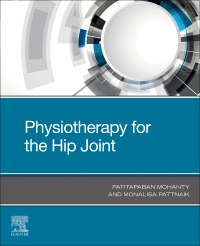
Physiotherapy for the Hip Joint, 1st Edition
Paperback

Now $127.40
-
-
Includes introductory chapters covering anatomy and biomechanics.
-
Offers comprehensive coverage of hip conditions from trauma to deformities to post-surgical rehabilitation.
-
Discusses clinical reasoning for posterior hip pain, piriformis syndrome, sacroiliac joint dysfunction, lumbar radiculopathy and meralgia paresthetica.
-
Consolidates today's available information on this timely topic into a single, convenient resource.
-
-
CHAPTER 1 Anatomy and biomechanics
References
CHAPTER 2 Evaluation
History
Physical examination
Observation
Inspection
Movement evaluation
Neuromuscular evaluation
Palpation
Special test
Diagnostic imaging
References
CHAPTER 3 Deformities
Coxa valga
Inspection
Special test
Treatment
Coxa vara
Causes
Special tests
Anteversion
Consequences of internal rotation of the hip
Management
Retroversion
Hip flexion deformity
Pelvic tilt
Anterior pelvic tilt
Posterior pelvic tilt
Infrapelvic tilt
Suprapelvic tilt
References
Further reading
CHAPTER 4 Arthritis conditions
Osteoarthritis/degenerative joint disease of hip joint
Causes
Pathology
Clinical features
Movement evaluation
Management
Rheumatoid arthritis (RA)
Etiology
Pathogenesis
Triggering stage
Maturation stage
Targeting stage
Fulminant stage
Signs and symptoms
Early signs
Complications
Diagnosis
Types of rheumatoid arthritis
Treatment
Prognosis
Physiotherapy
Exercises
Morbidity and mortality
Informing patient of diagnosis
Discussing prognosis and treatment
Dealing with misconceptions
Supporting patient with debilitating disease
References
CHAPTER 5 Traumatic conditions
Fracture neck of femur
Management
Postoperative PT
Complications
Fracture trochanter
Fracture pelvis
Causes
Clinical features
Emergency stabilization
Physical examination
Treatment
Physical therapy management
Complications
Dislocation
Clinical feature
Management
Complications
Management of anterior dislocation
Central dislocation
Clinical feature
Management
Complications
Avascular necrosis of the femoral head
Causes
Pathophysiology
Signs and symptoms
Diagnosis
Treatment
Prognosis
Hip labral tears
Causes
Clinical features
Phase 1dinitial exercise (week 1e4)
Treatment modalities
Phase 2dintermediate exercise (week 5e7)
Phase 3dadvanced exercise (week 8e12)
Phase 4dsport specific training (12.......week onwards)
References
CHAPTER 6 Overuse conditions
Trochanteric bursitis
Clinical feature
Management
Iliotibial band friction syndrome (ITBFS)
Clinical features
Management
Muscle strain
Adductors strain
Management
Pulled hamstrings injury
Management
Rectus femoris strain
Management
Osteitis pubis
References
Further reading
CHAPTER 7 Surgical conditions
Hip arthroplasty
Surgical options: bearing surfaces (polyethylene metal or ceramic)?
Surgical options: hemiresurfacing hip arthroplasty
Surgical options: pelvic osteotomy and hip fusion
Effectiveness
Urgency
Risks
Managing risk
Preparation
Timing
Anesthetic
Hospital stay
Recovery and rehabilitation in the hospital
Hospital discharge
Physical therapy
Can rehabilitation be done at home?
Usual response
Returning to ordinary daily activities
Summary of total hip arthroplasty, hip resurfacing,
and minimally invasive hip surgery for hip arthritis
Arthroplasty.
Excision arthroplasty
Replacement arthroplasty
There are 2 techniques
There are 2 approaches
Indications
Postop complications
Postoperative physiotherapy
Synovectomy
What is the recovery process of a synovectomy?
Indications
Postoperative care
Hip arthroscopy
Indications
Procedure
Postoperative physiotherapy following hip arthroscopy
Phase 1: mobility and initial exercise
Phase 2: intermediate exercise and stabilization
Phase 3: advanced exercise and neuromotor control
Phase 4: return to activity
Hip arthrodesis
Osteotomy
Postop physiotherapy
Phase 1: post-op day 1e7
Phase 2: post-op day 8e21
Phase 3: post-op day 22 to end of 6 weeks
Heterotopic bone (HO)
Chronology of development of heterotopic ossification
Diagnosis
Brooker classification of heterotopic ossification (following THA)
Schmidt and hackenbrock classification of heterotopic
ossification (following THA)
McAfee’s classification of heterotopic ossification
(following total disc arthroplasty)
Management
Physiotherapy
Postoperative rehabilitation
Phase I (week 1)
Phase II (2e8 weeks)
Phase III (9e24 weeks)
References
CHAPTER 8 Miscellaneous conditions
Congenital dislocation of hip
Causes
Pathomechanics
Clinical feature
Management
Close reduction
Open reduction
Complications
Outcomes
Slipped capital femoral epiphysis
Cause
Pathomechanics
Clinical features
X-ray
Management
Complications
Perthes disease
Causes
Pathogenesis
Clinical features
Investigations
Management
Piriformis syndrome
Peripheral nerve injury about hip
Meralgia paresthetica
Management
Clinical reasoning
Clinical reasoning for posterior hip pain
Clinical reasoning for lateral hip pain
Clinical reasoning for anterior hip pain
References
Index

 as described in our
as described in our 